About the entrance examination
Special oral examination for master courseOrientation for the entrance examinationGuide for entrance examinations / Required files (Guide for entrance examination, Summary of your desired master/doctor thesis project and Grade summary sheet)Information about exam subjectsEntrance Examination FAQFor those aiming for EEIS
Testimonials of StudentsCareer paths and Ph.D.Financial support for graduate students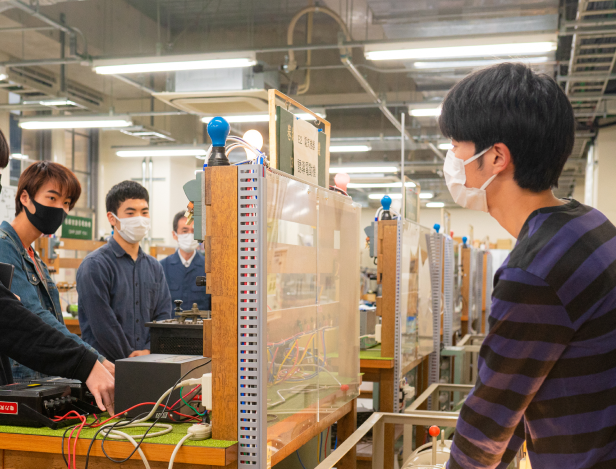
Discover the Future through
Electrical Engineering and Information Systems
Humanity has continued to prosper by skillfully manipulating
the real world of physics and the abstract world of
information while going back and forth between these two worlds.
By inventing language, we abstracted information and succeeded
in recording and communicating it using physics
such as words and characters.
In today's world where everything is connected to the Internet
and processed by artificial intelligence, not only
information technology, but also the physical technology that
supports it is changing our society with tremendous power.
In the Department of Electrical Engineering and Information
Systems, we aim to master both physics and information,
and bring innovation to everything from nanodevices to space.
Department of Electrical Engineering and Information Systems (EEIS)
Department of Electrical Engineering and Information Systems
EEIS research field
EEIS has eight fields, and research is conducted at the Hongo Campus, Komaba Research Campus, Kashiwa Campus, and Sagamihara Campus.
In every field, our mission is to open up the future with advanced technology and tackle important global issues.
EEIS has inherited the history and tradition of being the first university department in the world to specialize in electrical engineering (1873) and is responsible for the core fields of engineering, and values the frontier spirit that has always created new concepts and cutting-edge technologies that open up new eras.
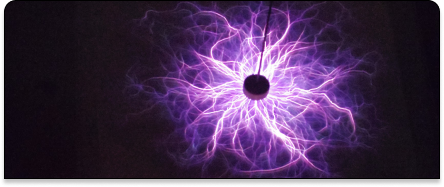
 Environment and energy
Environment and energy
This is a research field that targets physical devices and equipment systems in other areas related to environmental energy.
Energy engineeringDesign and evaluation of sustainable and environmental conscious systemNanostructural physicsPlasma sciencePlasma electronicsApplied materialsNuclear fusion studiesOptical engineering, Photon scienceElectronic materials/Electric materialsPower engineering/Power conversion/Electric machinery
See faculty members in this field
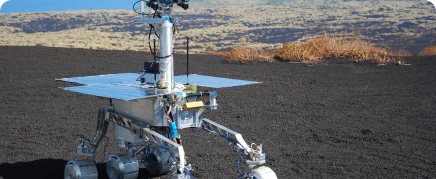
 System control and space
System control and space
This research field is related to robots, railways, automobiles, and space. Electronic engineering and control technology are core technologies in this field.
Dynamics/ControlMeasurement engineeringAerospace engineeringControl engineering/System engineeringIntelligent mechanics/Mechanical systemsElectronic materials/Electric materialsPower engineering/Power conversion/Electric machinery
See faculty members in this field

 Nano physics and devices
Nano physics and devices
This field is divided into Hongo and Komaba, and researches the area where electronics and physics intersect.
Electron device/Electronic equipmentElectronic materials/Electric materialsNanostructural physicsThin film/Surface and interfacial physical properties Applied materialsOptical engineering, Photon scienceNanomaterials engineeringCommunication/Network engineeringBiomedical engineering/Biomaterial science and engineeringNano/Microsystems
See faculty members in this field
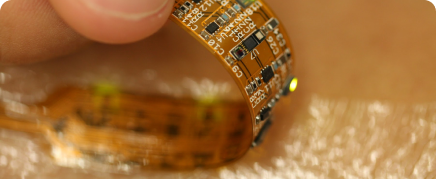
 Biotechnology and complex systems
Biotechnology and complex systems
A unique research field that aims to construct a new research paradigm through the fusion of bioscience and engineering.
Mathematical informaticsSoft computingLife/Health/Medical informaticsThin film/Surface and interfacial physical properties Optical engineering, Photon scienceElectronic materials/Electric materialsElectron device/Electronic equipmentKansei informaticsBiomedical engineering/Biomaterial science and engineeringMedical system
See faculty members in this field

 Media, intelligence, and computation
Media, intelligence, and computation
In this field, research studies on information science and high-performance computers are conducted. This field also explores the relationship between information technology and humans.
Computer systemSoftwareLearning support systemKansei informaticsHigh performance computingInformation securityPerceptual information processingIntelligent roboticsIntelligent informaticsCognitive science
See faculty members in this field

 Ubiquitous information environment
Ubiquitous information environment
This field widely covers network infrastructures that support the next-generation society.
Web informatics, Service informaticsComputer systemHigh performance computingInformation securityInformation networkPerceptual information processingIntelligent informaticsCommunication/Network engineering
See faculty members in this field
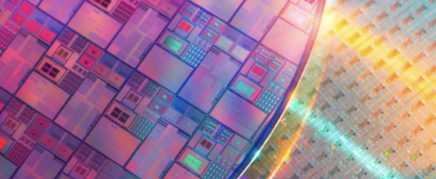
 Semiconductor systems
Semiconductor systems
This field researches high-performance computing technology and software technology mainly using semiconductor integrated circuit technology.
Energy engineeringComputer systemNanobioscienceHigh performance computingInformation securityControl engineering/System engineeringPerceptual information processingIntelligent informaticsCommunication/Network engineeringElectron device/Electronic equipment
See faculty members in this field
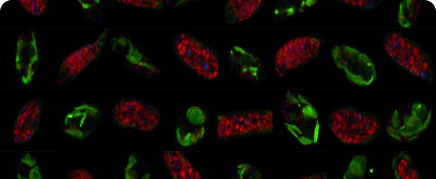
 Photonics and wireless
Photonics and wireless
In this field, research on measurement sensing communication systems using light and radio waves is conducted.
Soft computingMeasurement engineeringOptical engineering, Photon scienceIntelligent informaticsCommunication/Network engineeringElectron device/Electronic equipmentNatural disaster/Disaster prevention science
See faculty members in this field
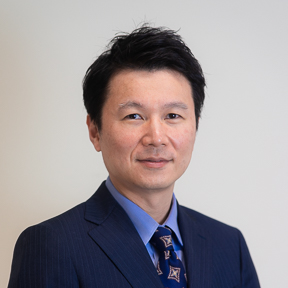
Message from the Chair
“Master physics, and transform the information society. Master information, and transform the physical world.”
Our Departments of Information and Communication Engineering and Electrical and Electronic Engineering, collectively forming the Department of Electrical Engineering and Information Systems, trace their origins back to 1873, with the establishment of the Telegraphy Division of the Imperial College of Engineering—the world’s first dedicated department of electrical engineering. This predates even the founding of the University of Tokyo by four years. Over the past 150 years, we have continually honored our rich history and tradition while dynamically evolving, pioneering groundbreaking technologies and contributing significantly to society through cutting-edge research and education in electrical, electronic, and information technologies.
Today’s transformative innovations emerge at the intersection of physical sciences and information technology. Recognizing this, we operate two closely integrated undergraduate departments: the Department of Information and Communication Engineering, which focuses on mastering information science, data science, AI, algorithm design, and communication networks; and the Department of Electrical and Electronic Engineering, which emphasizes a deep understanding of physical sciences such as electromagnetics, quantum mechanics, energy engineering, and semiconductor devices. By combining the strengths of these two interconnected departments, we cultivate students with a broad vision, profound expertise, and the practical skills necessary to excel in our rapidly changing technological landscape.
For students aspiring to engage more deeply with specialized research and advanced innovation, we offer graduate-level education through our Electrical Engineering and Information Systems graduate program. At the graduate level, students expand upon the foundational knowledge acquired at the undergraduate level and engage in advanced, multidisciplinary research projects aimed at transformative technological breakthroughs. Notably, our graduate program places a strong emphasis on global engagement, welcoming talented international students and researchers from around the world, and actively encouraging our own students to participate in collaborative research with top universities and research institutions abroad. Through these efforts, we aim to foster researchers and engineers equipped to thrive on the global stage.
Today’s rapid technological advancements—especially those centered around AI—cannot be achieved solely through innovations in software or algorithms alone. Handling massive datasets and complex computations requires cutting-edge semiconductor devices, ultra-high-speed communication infrastructure, and highly efficient computing technologies. At the same time, new algorithms and energy-efficient hardware solutions, coupled with sustainable energy management technologies, are critical for managing the enormous energy consumption involved. Addressing these complex challenges demands a deeply integrated approach—uniting physics-based technological innovations with advancements in information science and computational techniques.
To support such comprehensive education and research, our department provides world-class facilities, including advanced cleanrooms, state-of-the-art AI data centers, and sophisticated prototyping laboratories. Additionally, we leverage our extensive partnerships with leading industries and research institutions, both domestically and internationally, providing our students with an environment conducive to innovation, experimentation, and practical implementation of their ideas.
Electrical, electronic, and information technologies underpin our modern world, forming the core of all industries and playing an essential role in shaping sustainable societies. The demand for electrical and information engineers and researchers continues to grow globally, reflecting the increasing reliance of modern society on these foundational technologies.
We seek individuals who share our sense of pride and responsibility in this crucial societal mission—those who are driven by passion, curiosity, and determination to actively shape the future. Join us in our proud tradition of excellence and innovation as we build the future together.
Chair
Department of Electrical Engineering and Information Systems